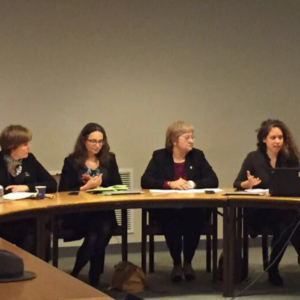 In the side-lines of the 48th session of the UN Statistical Commission (UNSC) in New York, the Expert Group on Refugee and IDP Statistics (EGRIS) updated participants on work undertaken by the group since it was mandated in 2016. Co-chaired by Statistics Norway, Eurostat and UNHCR, the Group has been working hard in recent months to produce two reports – a Handbook on Refugee Statistics and a Technical Report on IDP Statistics – that will be presented at the 49th UNSC session in 2018.
In the side-lines of the 48th session of the UN Statistical Commission (UNSC) in New York, the Expert Group on Refugee and IDP Statistics (EGRIS) updated participants on work undertaken by the group since it was mandated in 2016. Co-chaired by Statistics Norway, Eurostat and UNHCR, the Group has been working hard in recent months to produce two reports – a Handbook on Refugee Statistics and a Technical Report on IDP Statistics – that will be presented at the 49th UNSC session in 2018.
 The side event generated significant interest amongst the wider audience of the Commission and also secured participation of new members. The sub group on IDP statistics, which is co-chaired by JIPS, Statistics Norway and the IDMC, currently counts on colleagues from Azerbaijan, Bosnia, Cote d’Ivoire, Colombia, the Kurdistan Region of Iraq, Kosovo, Philippines, Somalia, Uganda and Ukraine, alongside subject matter experts from UNHCR and the World Bank. Around 20 other countries, alongside international partners, are participating in the refugee statistics work stream.
The side event generated significant interest amongst the wider audience of the Commission and also secured participation of new members. The sub group on IDP statistics, which is co-chaired by JIPS, Statistics Norway and the IDMC, currently counts on colleagues from Azerbaijan, Bosnia, Cote d’Ivoire, Colombia, the Kurdistan Region of Iraq, Kosovo, Philippines, Somalia, Uganda and Ukraine, alongside subject matter experts from UNHCR and the World Bank. Around 20 other countries, alongside international partners, are participating in the refugee statistics work stream.
JIPS was asked to lead the group based on its extensive experience working in support of national statistical offices and other government counterparts in displacement affected countries.
Questions raised during Q&A went straight to the heart of the matter: how will the IDP report incorporate issues still unclear in relation to the conceptual framework on IDPs? And how will the work deal with political sensitivities inherent in IDP data that could present hurdles to the work moving forward?

These and other questions are partially clarified by the scope of the work ahead and will be further addressed in the next Expert Group meeting in Oslo at the end of April 2017.
Building on the enthusiasm and energy of different members and the variety of hands-on experience they bring, the IDP sub-group will work together on a technical stock-taking exercise of current practice. The resulting Technical Report on IDP Statistics to be delivered for the UNSC’s 49th session in 2018 aims to formulate tangible and experience-informed recommendations for the improvement of official statistics on IDPs, with the ultimate objective of strengthening the evidence-base for informed national policy and response.